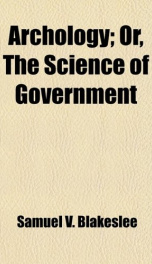archology or the science of government

Purchase of this book includes free trial access to www.million-books.com where you can read more than a million books for free. This is an OCR edition with typos. Excerpt from book: CHAPTER III. THE THREE CLASSES OF GOVERNMENT CONTRASTED. In the distinguishing feature of each class of government is found the single element from which or in which commences the control. In Material Government the primal element in which the control begins is matter. In Instinctive Government the primal element in which the control begins is impulse. In Rational Government the primal element in which the control begins is will. In the development of the science of archology it is of the utmost importance, that these three primal elements of control be kept clear and distinct in the inind. The mixing or confusing of them with one another, or with other elements, is sure to result in the greatest errors. They are in themselves simple, and in their departments, supreme. They are matter, impulse, will; unconscious matter; impulse with consciousness and a form of will; and will with consciousness, knowledge, reason, desire, impulse, motive, plan, and all else pertaining to a rational being. Matter, impulse, will; each simple and supreme in its department, controlling and necessitating all within the sphere of its government. The higher government can control the lower through its laws; never the lower control the higher. The instinct of the animal may govern matter and determine its action in harmony with impulse; and this it must do, if done at all, by availing itself of the laws of matter. But matter cannot govern the animal by availing itself of the laws of instinct. Matter, through the laws of matter, may govern the animal as matter, but never through the law of instinct. So also the will of a rational being may, through the laws of instinct and of matter, force the instinct of the animal and all the elements of matter into subservience to the designs of the ...
Info about the book
Author:
Series:
Unknown
ISBN:
0521131782
Rating:
5/5 (5)Your rating:
0/5
Languge:
English
Users who have this book
Users who want this book
What readers are saying
What do you think? Write your own comment on this book!
write a commentGenre
if you like archology or the science of government try:
Other books by this author
Do you want to exchange books? It’s EASY!
Get registered and find other users who want to give their favourite books to good hands!

